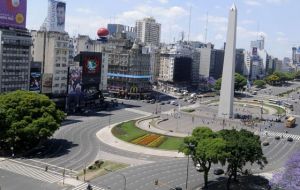MercoPress. South Atlantic News Agency
General strike, supported by pickets paralyzed Argentina
 A rare view of downtown Buenos Aires by the Obelisk virtually deserted
A rare view of downtown Buenos Aires by the Obelisk virtually deserted Two main opposition umbrella trade unions and other organizations protesting Argentina's economic policies paralyzed the country on Tuesday in the first general strike since President Cristina Fernandez took office five years ago.
Organized pickets and demonstrators in the capital Buenos Aires burned tires to block roads and vandalized a handful of the businesses that opened despite the 24-hour work stoppage called by bus drivers, train conductors and port, airline and bank workers.
The general strike - the first to hit Argentina in a decade - follows broad protests held on November 8 over high crime, soaring inflation, corruption and the government's policy response.
Farmers also joined the protest led by Hugo Moyano, a former truck driver once closely linked to Cristina Fernandez but now a leading opposition figure. He wants lower taxes for workers whose purchasing power has been drained by galloping inflation.
“The silence of the streets, the absence of people in the streets, in the shops, in the businesses - this is the voice that the government must hear,” Moyano told reporters, vowing to keep pressing the demands of his CGT labour federation.
The Argentine president’s popularity has tumbled since she easily won re-election last year. Inflation is running at above 25% despite an anaemic economy, according to private economists. The government publishes much lower inflation data long dismissed by the markets as inaccurate.
The strike increases the stakes in the political battle between Moyano and Cristina Fernandez, who condemned the strike and said she would not be swayed on policy.
“Today wasn't a strike. It wasn't even a picket. This was about strong-arm tactics and threats,” she told supporters at a rally. “We cannot bow to extortion.”
Ties between Moyano and the president soured after the death in late 2010 of Nestor Kirchner, Fernandez's husband and predecessor as president.
Moyano's CGT split earlier this year, with his allies re-electing him as leader in a vote rejected by rival union bosses aligned with Cristina Fernandez. The fracture in the umbrella group risks deepening labour unrest as inflation stokes wage demands and the economy is decelerating.
But Cristina Fernandez has not been inactive and the opposition has no candidates or names, so far, to challenge her. So her allies in Congress last month lowered Argentina's voting age to 16 from 18, a change that could help the politically ailing president court the youth vote ahead of 2013 mid-term elections.
”This (strike) was necessary, unfortunately,“ said Eduardo Buzzi, who heads the Argentine Agrarian Federation, which represents small-scale farms. ”There is no way to dialogue. ... This is the most anti-farm government Argentina has ever had.”
The agricultural sector has long quarrelled with Cristina Fernandez over the 35% export tax her government puts on soybean exports and curbs it places on corn and wheat shipments.
Telephone calls went unanswered at the main grains port of Rosario. The usually noisy, truck-jammed entrance to the port of Buenos Aires was still, with activity expected to resume on Wednesday. The local stock and bonds market was also quiet.






Top Comments
Disclaimer & comment rules-

-

-

Read all commentsCFK has finally made the main world news in The Telegraph:
Nov 21st, 2012 - 07:51 am 0http://www.telegraph.co.uk/news/worldnews/southamerica/argentina/9692214/Kirchners-popularity-in-freefall-amid-new-mass-protest.html
If this doesn't constitute a strike, what does?
Nov 21st, 2012 - 09:57 am 0She won't listen and inflation is the 4th highest in the world. Sad woman for sure.
Nov 21st, 2012 - 11:56 am 0Commenting for this story is now closed.
If you have a Facebook account, become a fan and comment on our Facebook Page!